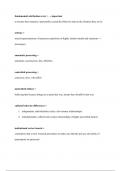Summary
Behaviour & Environment 1: Introduction Summary 2023
- Course
- Institution
This is everything you need to know and understand to complete this course (behaviour and environment 1 of the psychology program). It includes everything from the lectures and the book. The material is written in a way where you can also use it as flashcards to study. I studied this and passed eas...
[Show more]



